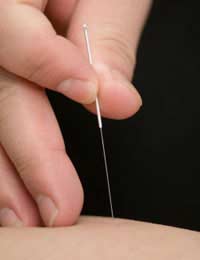Alternative Therapies for Eating Disorders

Eating disorders such as anorexia bulimia and binge eating disorder are usually treated by both medical and mental health professionals. While alternative therapies should not replace these traditional treatments, they can be used to complement treatment and offer individuals further support and means of healing.
Anyone considering engaging in alternative therapies for eating disorders should check with all of their doctors and therapists before agreeing to a course of treatment, and discuss their disorder with their alternative therapist. If alternative therapies do not bring relief or healing an individual should not feel pressured into continuing them and instead should return to activities and treatments which they find comfortable and beneficial.
Traditional Treatments for Eating Disorders
Eating disorders are usually treated both for physical and mental/emotional healing. Usually physical concerns are treated first if they present a significant health risk, or at the same time as mental health issues.Some individuals with eating disorders may be treated in a residential hospital or clinic to regain their strength, though almost any treatment plan for an eating disorder will include at least one of the following: counselling or talk therapy, family counselling, cognitive behaviour therapy (to change food, eating and/or exercise behaviours), support groups or group therapy, and nutritional counselling and planning.
Medication is not often prescribed to treat an eating disorder unless appetite suppressants are prescribed under a doctor’s supervision (such as for binge eating disorder) or medication is used to treat an associated condition such as with anti-depressants (for depression).
Alternative Therapies for Eating Disorders
Alternative therapies tend to take a holistic approach to treating the entire person, and so are very useful for supporting both physical and mental healing. Anyone interested in alternative therapies for eating disorders should clear it with their medical professionals and discuss their disorder, and current treatments, with the alternative therapist before undergoing any therapy.Common alternative therapies that are undertaken by individuals with eating disorders include:
- Acupuncture – a traditional Chinese therapy in which small needles are inserted into the skin at specific points to relieve pain and promote healing. All acupuncture practitioners should be registered with a governing body such as the Acupuncture Society.
- Aromatherapy – the therapeutic use of essential oils from plants, flowers and trees to achieve health and vitality. Often aromatherapy is incorporated into massages, facials and baths.
- Homeopathy – the therapeutic use of small doses of medicines to stimulate the body’s natural defence systems in order to re-balance the body. Qualified homeopaths should be registered with the Society of Homeopaths.
- Naturopathy – the therapeutic use of natural healing techniques and prescriptions of plant and flower extracts. Naturopaths should be registered with the General Council and Register of Naturopaths.
- Massage Therapy – body massage, or the rhythmic, therapeutic stroking and kneading of the muscles, relaxes and soothes the body and calms and refreshes the mind.
- Meditation – a method of suspending thought and directing attention in a calm and focused manner. Classes as well as individual lessons are usually available.
Further Information
Further information on eating disorders can be obtained by any medical or mental health professional as well as the Eating Disorders Association and/or National Centre for Eating Disorders. Further information on alternative or complementary therapies is available from UK Therapy or by speaking with a local alternative therapist.- Creating Healthy Attitudes Towards Food
- Cognitive Behavioural Therapy for Eating Disorders
- Eating Disorders and Interpersonal Therapy
- Family Therapy and Eating Disorders
- Group Therapy for Eating Disorders
- Support Groups for Individuals
- Eating Disorders and Psychoanalytic Psychotherapy
- Hospitalisation and Eating Disorder Clinics
- Rationale Emotive Therapy for Eating Disorders
- Medication Used to Treat Eating Disorders
- Nutritional Counselling and Advice


Re: Eating by Texture
i can't eat porridge, yogurt and the most types of meat. also i can't drink kefir and juices. i just can't stop gagging while eating/drinking…
Re: Colour Coded Eating
I eat all colors but I can't have more than one color in my mouth at a time, like I can't eat fruity pebbles there's too many colors that I…
Re: Eating by Texture
I need to understand my oroblem. Eating health is hard. I cant really diet due to food allergies and diabetes, but I have a lit of food…
Re: Eating Disorders and the Physical Signs
I’ve been to the gp several times but apparently I don’t look anorexic. I’m 5’3 and weigh around 49 kg. When I eat I…
Re: Dental Damage and Eating Disorders
If you're worried about your weight, eat healthy, research your ideal weight for your age, height and bone structure and…
Re: Eating by Texture
Hi I've avoided soft textured food forever. My father also & he has this full blown, only eats crunchy things. Over the decades it's got better…
Re: Recovering From Anorexia: How Do I Prevent Swollen Stomach?
My daughter is recovering from anorexia (34 hrs old - diagnosed 15 years ago) What do I…
Re: Eating by Texture
I don’t like most veg. The only raw veg I can eat is cucumber. Cooked, I like carrots, cauliflower, baby corn, onion (if it’s well cooked and/or…
Re: Pica Disorder
Potato Boy back. I was doing great for a while but then shelby left me for my dad. I was doing so good. My best friends had an intervention for me and…
Re: Why Does Eating Make Me Feel Sick?
I'm a 22 year old female who has been suffering with anorexia for four years. My fiance and I recently broke up, and I had…